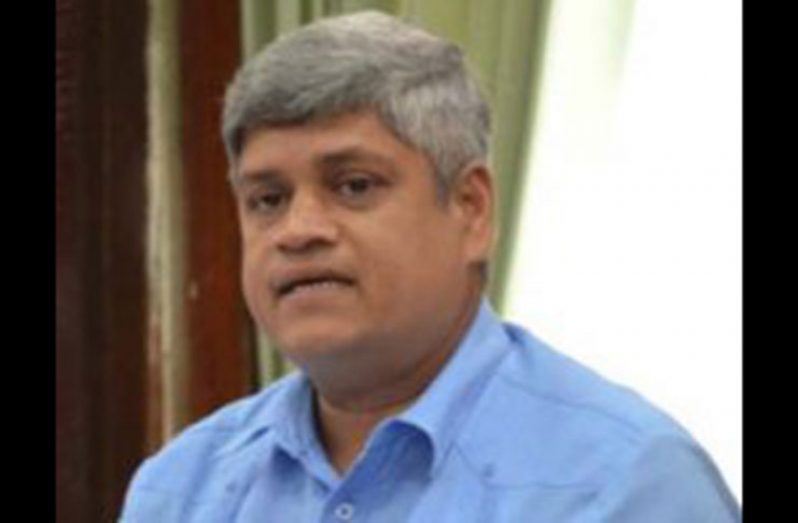…Min Sharma says UN ruling vindicates decision to keep US$18M in escrow
JUNIOR Finance Minister Jaipaul Sharma is convinced that the ruling by the United Nations to refer Venezuela’s spurious claim over a large part of Guyana’s territory to the World Court has vindicated the government in its decision to keep the US$18M signing bonus from Exxon Mobil out of the Consolidated Fund for emergency purposes.
Despite acknowledging the law that requires the government to place all relevant funds into the state’s account, Sharma insists that there are several “real” issues being considered, given that the money is needed for an urgent national issue.
Sharma was at the time responding to the opposition’s decision to mount a legal challenge against the government for not placing the money into the Consolidated Fund. Chief Justice Roxane George-Wiltshire last month ruled as flawed, an application by head of the Transparency Institute of Guyana Inc (TIGI), Troy Thomas, for the High Court to order Minister of Finance Winston Jordan to immediately deposit the US$18 million signing bonus into the Consolidated Fund.
When the matter was called, Justice George-Wiltshire said the application was procedurally flawed and told Thomas’s lawyer, Christopher Ram, to withdraw it or she would strike it out. The application which was filed by Ram was seeking, among other things, an order from the court directing that Jordan account for the bonus in the amended estimates of revenues of the public sector for the years 2017 and 2018. He also argued, according to the newspaper, that failure to do so is a violation of the constitution and the Fiscal Management and Accountability Act (FMAA). The PPP’s court challenge filed by Attorney Anil Nandlall is along the same line.
President David Granger had made it clear that his administration acted legitimately by accepting the US$18M signing bonus from U.S. oil giant, ExxonMobil, and placing same into an escrow account at the Bank of Guyana. He said that the money was received to address national security matters. “I am the head of government, I am responsible, I am aware of it and it is a legitimate Government of Guyana exercise; and I am aware that it is [at] Bank of Guyana in Escrow; once it is an Escrow account, it means that it cannot be used for purposes for which it is not intended,” he said in response to questions on the issue.
The President maintained that there was nothing wrong or illegal done, stressing that “It is a legitimate Government of Guyana practice and the money has not been dishonestly acquired and has not been used for purposes for which it is not intended.” He explained that the money was received at a time he believes that was necessary, given “some national security implications.” “It is a legitimate exercise, it is to be used for certain matters which we perceive to be of national security interest and [at] that point in time it was the thing to do, so that we can have access in the event of a national security emergency,” he said.
Territorial claim
Meanwhile, Sharma told the newspaper that government has already explained that the money from Exxon would be used to address Venezuela’s claim to Guyana’s territory. This was around the time the United Nations was winding down its intervention in the matter, and the possibility of going to the International Court of Justice in The Hague, Netherlands, was very real. The money would be necessary to pay lawyers to fight Guyana’s case and address other matters in this regard.
The government came in for stiff criticism from the opposition and some members of the public. Sharma agreed however that should the government put the money into the Consolidated Fund, they would have to first change the money into Guyana currency and then convert it back to U.S. dollars when it is ready to be used. This transaction however, would not only cause the changed U.S. dollars to go into circulation, but it would decrease the actual amount of money to be regained, since the U.S. dollars will be bought back at a higher rate. This transaction could also be risky, since the possibility exists that when it is time to change the money back into U.S. dollars, the quantity might not be readily available.
Sharma went on say that to place the money into the Consolidated Fund could lead to more delays, since parliamentary intervention through a supplementary provision would have to be made to retrieve the money for the case. Sharma stated nonetheless that given this matter of grave concern, he is puzzled at the reaction of the opposition party. “Now at this point, at this time they choose to do it when the UN has cleared the way to the World Court over this border issue. The ruling of the secretary- general coincides with government’s decision which now vindicates us for having to use this money,” Sharma declared.
He described the opposition’s choice to file a case in the Supreme Court as “hypocritical” and “unpatriotic,” before reminding of former president Bharrat Jagdeo’s public declaration some years ago, to give a part of Guyana’s territory to Venezuela. Sharma noted further that it was the last Administration who on several occasions was called out by the then opposition for keeping large sums of money out of the Consolidated Fund.
In some cases, the opposition had taken the then government to the court for failing to adhere to the law and placing large sums of money into the National Industrial & Commercial Investments Ltd (NICIL), for example. In this case, Sharma defended, government is dealing with a serious and urgent matter, one of national security. He said there is enough evidence and reason for the government to keep this sum easily accessible. The Guyana Chronicle understands that currently, the US$18M is being kept in a “special interest-bearing account.”



.jpg)








